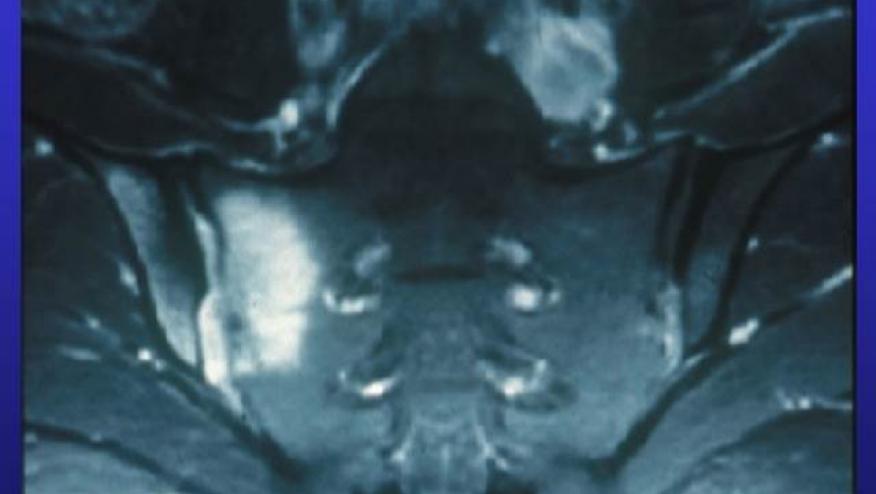Several Studies Addressed Treatment of Axial Spondylitis Save

Monday afternoon's session on the treatment of Axial Spondyloarthritis presented us with a great selection of studies addressing important issues in modern treatment paradigm of AxSpA. Clinical and functional improvement with IL17 inhibitors in TNF naïve patients, incidence of IBD with IL17i, TNFi retention over time were amongst topics discussed.
The session started with the results of a phase 3 randomized active and placebo-controlled trial of Ixekizumab (high-affinity anti-Il17 monoclonal antibody) (IXE) in bio-naïve patients with active radiographic AxSpA (ABST1864). In this 52-week study, clinical efficacy of IXE in two doses (40 mg Q2W and 40 mg Q4W) and ADA 40 mg Q2w as an active reference group were compared against placebo (PBO). Primary end point of ASAS40 at week 16 was met in all treatment groups with best response observed in IXE Q2W 52%, followed by IXE Q4W 48% , ADA 36% and PBO 18%. Secondary endpoints of ASDAS, BASFI, MRI spine SA score and AS –HI were met as well and IXE was found superior to PBO in improving signs and symptoms, MRI and quality of life in bio-naïve patients with r-axSpA.
Following, abstract 1865 highlighted efficacy of IXE in improving overall functioning and health in patients with axSpA. In this phase 3 trial, the ASAS HI ( the Assessment of SpA international Society Health Index) was assessed in bio-naïve r-axSpA patients and again, IXE-treated patient performed significantly better than PBO with significant ASA HI improvement in IXE Q4W at 41.8%, IXE Q2W 40.6%, ADA reference group 42.7% versus 34.5% PBO. This also correlated with better ASAS20/ASAS40 responses in IXE groups.
Moving on, abstract1866 addressed the issues of IBD incidence in Psoriatic Arthritis (PSA) patients treated with Ixekizumab. Data pooled from three phase-3 PsA studies (two of them randomized –controlled) and multiple phase 1-, 2- and 3- psoriasis (PSO) trials revealed that events of IBD (UC and CD) are rather infrequent in IXE-treated patients with incidence rate ranging from 0.5-4.5 per 1000 PY across all studies analyzed. Additional analysis and longer term data adjudication to better understand the relationship between IXE use and IBD are underway as per authors.
But how about the good old TNFi group?
ABST1867 presented data on drug retention and response rates to TNFi from the Eurospa Research Network Collaboration. From the 15 European registries we learn that retention rates tend to decrease for the 2nd and 3rd TNFi. The higher the number of previous TNFi the lower response rate. Just to give you an idea:
- 6 and 24 months retention rates for 1st TNFi: 87% and 71% respectively;
- 2nd TNFi 80% and 63%;
- 3rd TNFi 81% and 62%.
Similar trends were observed in ASDAS inactive disease rates and remission rates.
Make your own conclusions.
Continuing with the TNFi theme, abstract 1868 educated us on efficacy and safety of Certolizumab Pegol (CZP) in nr-axSpA patients, just to remind us that TNFi as a class does work of this indication but not all representatives of the class are FDA approved. In this phase 3 trial authors concluded that CZP, which is approved for AS but not nr-axSpA, does lead to meaningful and statistically significant improvement in ASDAS-MI and ASAS40 in nr-axSpA patients with ASAS40 response of 47.8% in CZP vs 11.4% PBO group at week 12. Don’t you agree CZP deserves a place amongst other TNFi for the indication?
Last but not least, abstract1869 wraps up the session with phase-3 study results on sustainability of efficacy and safety of Secukinumab in Ankylosing Spondylitis (AS) after 3 years of treatment. Similar to the earlier Secukinumab studies, response rates remain higher with the 300 mg dose (both ASA40 and ASAS PR). The safety profile consistent with previous reports with candida infections and serious infections being 0.7 and 0.7 per 100 patient-years respectively. No cases of IBD, deaths or any new safety signals observed. Secukinumab seems to be working well overtime.
Overall, it was a great and informative session. If you couldn’t make it I hope this brief review covers it all for you.










If you are a health practitioner, you may Login/Register to comment.
Due to the nature of these comment forums, only health practitioners are allowed to comment at this time.